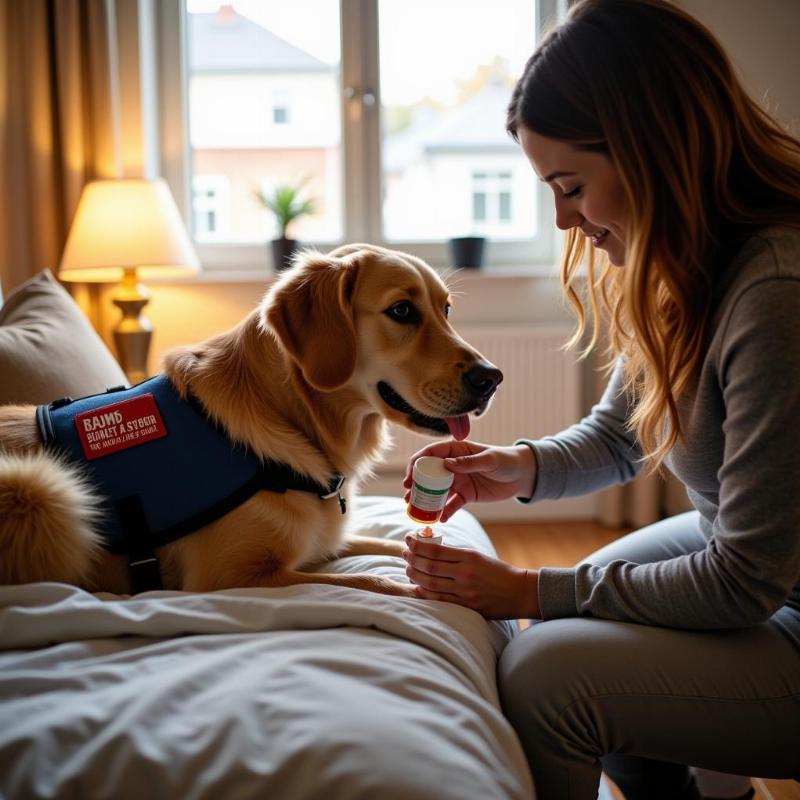Crohn’s disease can significantly impact daily life, making everyday tasks challenging. A service dog trained specifically for Crohn’s can offer invaluable support and improve the quality of life for individuals managing this condition. This comprehensive guide explores the benefits, training, and considerations for a service dog for Crohn’s disease in the United States.
Understanding the Role of a Service Dog for Crohn’s
A service dog for Crohn’s disease isn’t just a companion; it’s a trained partner that can assist with a variety of tasks related to the condition. These tasks can range from retrieving medication and alerting others during a flare-up to providing deep pressure therapy for pain relief and offering emotional support during stressful times. The dog’s presence can bring a sense of stability and independence, empowering individuals to navigate their daily routines with greater confidence.
 Service dog retrieving medication for a Crohn's patient
Service dog retrieving medication for a Crohn's patient
Benefits of a Service Dog for Crohn’s Patients
The benefits extend beyond physical assistance. Service dogs can alert to oncoming flare-ups, sometimes even before the individual is aware, allowing for proactive management. They can retrieve medication, water, or other necessary items, minimizing the physical strain during a flare. The emotional support provided by a service dog can be invaluable, reducing anxiety and stress associated with the condition.
Training a Service Dog for Crohn’s Disease
Specialized training is essential for a service dog to effectively assist someone with Crohn’s disease. This training focuses on tasks specific to the condition, including recognizing and responding to flare-ups, retrieving medication and other items, and providing deep pressure therapy. Reputable service dog organizations in the US adhere to strict training standards to ensure the dog is properly equipped to support its handler.
Finding and Choosing a Service Dog
Finding the right service dog is a crucial step. Reputable organizations in the US specializing in service dogs for medical conditions are the best place to start. These organizations thoroughly assess the dog’s temperament, train them rigorously, and match them with individuals based on their specific needs. Consider factors such as the organization’s reputation, training methods, and the overall health and temperament of the dog.
Legal Rights and Responsibilities of Service Dog Handlers
In the US, service dogs are protected under the Americans with Disabilities Act (ADA). This law allows service dog handlers access to public places that may otherwise restrict animals. Understanding your rights and responsibilities as a service dog handler is crucial for navigating public spaces with your dog.
Financial Considerations and Resources
The cost of acquiring and caring for a service dog can be significant. Exploring various financial assistance programs and resources available in the US can help alleviate some of the financial burden. Several organizations offer grants, fundraising support, and other resources to help individuals access service dogs.
Conclusion
A service dog can be a life-changing partner for someone with Crohn’s disease. From providing practical assistance to offering emotional support, these highly trained dogs empower individuals to manage their condition and improve their quality of life. Researching reputable organizations, understanding your legal rights, and exploring financial resources are essential steps in embarking on this rewarding journey with a service dog for Crohn’s.
FAQ
- How much does a service dog for Crohn’s cost? The cost can vary, but it can range from several thousand dollars to upwards of $20,000 depending on the organization and training involved.
- How long does it take to train a service dog for Crohn’s? Training can take anywhere from several months to two years depending on the dog’s aptitude and the specific tasks being taught.
- Where can I find a reputable service dog organization? Start by researching organizations accredited by Assistance Dogs International (ADI).
- Are service dogs allowed in all public places? Generally, yes, under the ADA. However, businesses can ask if the dog is a service dog and what tasks it is trained to perform.
- What are the responsibilities of a service dog handler? Handlers are responsible for their dog’s care, behavior, and well-being, ensuring they are properly trained and under control at all times.
- Can any dog be trained as a service dog for Crohn’s? Not all dogs are suitable. Service dogs require specific temperaments, intelligence, and trainability.
- What kind of tasks can a crohn’s disease service dog perform? Tasks include alerting to flare-ups, retrieving medication, providing deep pressure therapy, and offering emotional support.
Beautdogs.us is your premier destination for all things dog-related in the US. We offer expert advice on dog breeds, care, and products. Whether you’re a seasoned dog owner or just starting out, Beautdogs.us is your trusted source for comprehensive and engaging information. Contact us at [email protected] or call us at +1 501-555-7529. Learn more at Beautdogs.us.